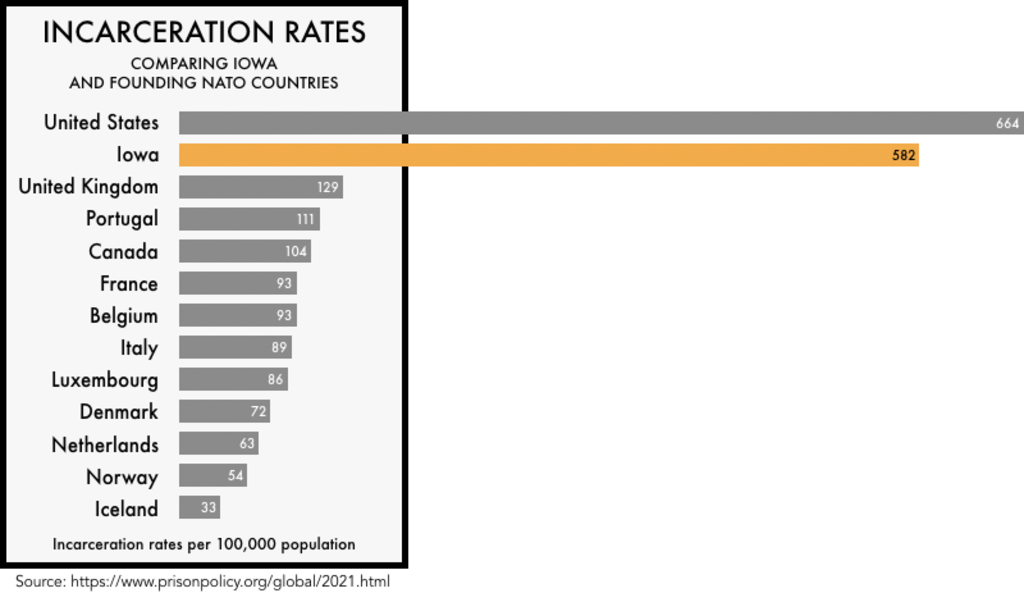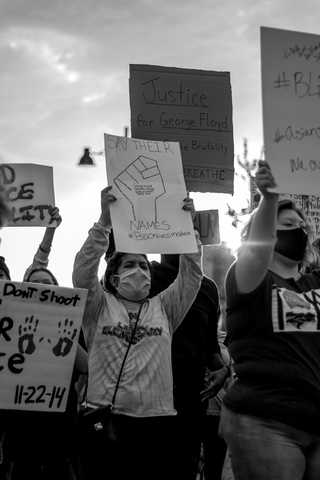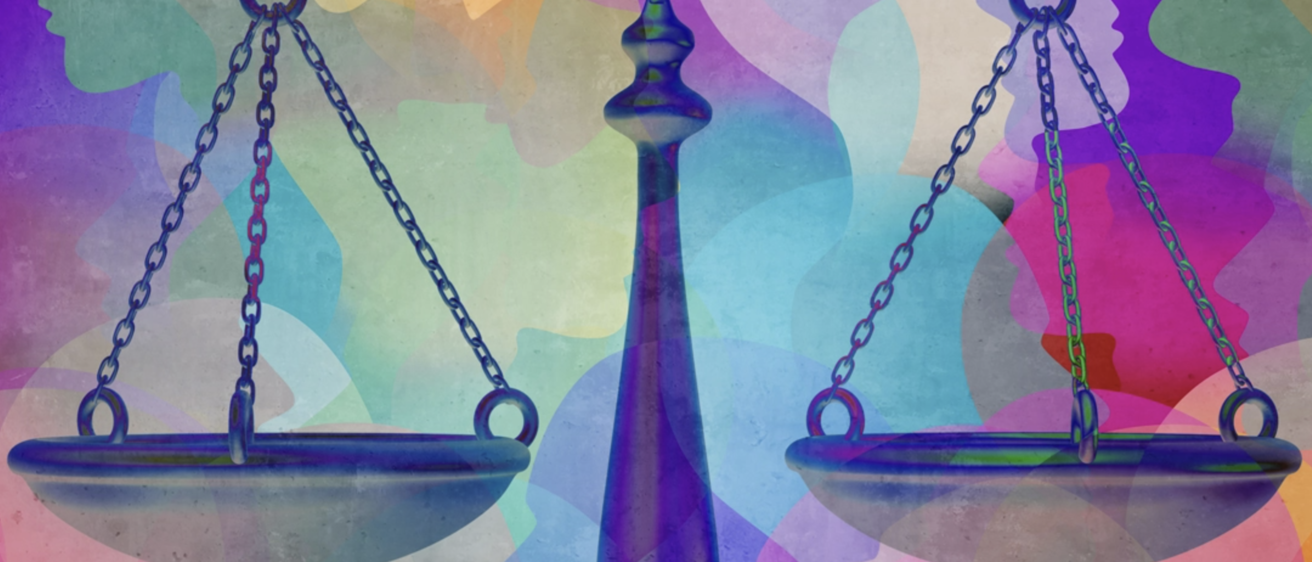Why We Say “Criminal Legal System,” Not “Criminal Justice System”
- Nearly half (46%) of the federal prison population is incarcerated for non-violent drug offenses. (Source: BOP Statistics: Inmate Offenses)
- America is the world’s biggest jailer with 2.3 million in prison.
- Another 7 million are under correctional supervision or control.
- 19 million Americans have felony convictions.
- 77 million Americans have a criminal record—influencing their economic mobility and educational prospects.
- 113 million American adults have an immediate family member who has been in prison or jail.

Nationally, there are over 45,000 laws governing the rights of formerly incarcerated creating a permanent underclass of lesser citizens. In Iowa alone, there are 608 policies and sanctions that target people with a criminal record including: 347 targeting employment, 28 limiting political and civic participation, 40 constraining family and domestic rights, and 18 constricting one’s ability to rent housing or living arrangements. (Source: 'Halfway Home' Examines The 'Afterlife' Of Incarceration)
Criminal law reform tackles the issue of structural systems of oppression that lead to disproportionate rates of imprisonment against BIPOC, low-socioeconomic, and other disadvantaged communities. Topics include (but are not limited to) mass incarceration, the war on drugs, abolition, school-to-prison-pipeline, wrongful convictions, restorative justice, social impacts of incarceration (on family members and community), police brutality, and racial profiling.

The criminal legal system is composed of several cogs that all work together (in variation):
- Law enforcement
- Prosecution services
- Defense bar
- Courts
- Legal aid
- Victim services
- Correctional services
- Legislatures (which enact the law)
- Various stakeholders (investors), service providers, and community groups (private prisons like Iowa Prison Industries—a $25 million enterprise)
- Social support systems, like housing, health care, education, employment, and child protection.
“The U.S. spends $81 billion a year on mass incarceration, according to the Bureau of Justice Statistics, and that figure might be an underestimate. In 2017, the Prison Policy Initiative estimated the actual cost on state and federal governments and impacted families is roughly $182 billion.”
Collection
Education & Experience
- University of Iowa School of Social Work
- Social work allows for social justice to be achieved in the form of aiding people in navigating difficult or complex situations. By working as a criminal legal system social worker, your primary roles would be helping offenders find rehabilitation, intervention, and support navigating through the system.
- Bachelor of Arts in Social Justice | Gender, Women's and Sexuality Studies
- Getting a degree (or minor) in social justice will open the door to numerous career opportunities in social justice work. This program will prepare you for a specific career in criminal justice reform by allowing you to explore injustices related to one's identity in conjunction with social movements.
- College of Law
- Law school allows you to gain an education that tailors to achieving social justice, specifically by attacking these issues at the source. Fighting for change for public policy at the state/federal level or personally aiding clients with lawful advice. A background in law isn't necessary, but can be applied to many job fields including social advocacy.
- Crime & Justice Public Policy
- The crime and justice policy research program focuses on how public policy affects criminal offending and the control these policies have on crime itself as well as looking at the physical and economic costs of crime. Participating in this research program will allow you to gain experience and understanding of the larger systems dealing with criminal justice.
- Certificate in Human Rights
- A certificate in Human Rights is offered by the University of Iowa’s College of Law. This certificate will allow you to gain insight and education regarding human rights law, history, and philosophy. A human rights certificate will be extremely beneficial for someone going into a career in law, social work, and non-profit sectors.
What To Do Now
Student Organizations
- Transform (ED) Justice Collaboratory
- “Students for Transformative Justice was established in 2020 to bring together: undergraduate and graduate students who have been impacted by the legal system; those who want to learn more about efforts to change the system; and those who are already engaged in campus and community movements to transform justice.”
Local Organizations
- Inside Out Reentry Community - Iowa City
- This non-profit focuses on helping former incarcerated people reintegrate into society, specifically in Johnson County. This process often begins while individuals are still incarcerated to develop a plan of reentry into society. Inside Out Reentry also hosts events to reduce the stigma around incarceration.
- Children of Promise Mentoring Program
- Children of Promise is a non-profit organization that specifically centers their work around the prevention of children going into the criminal justice system. They achieve this by their creation of a mentoring program where they match a child with a mentor to create a personal connection and allow the child to have someone to reach out to as well as look up to as a role model.
- Jail Alternatives Program in Johnson County
- “Mission is to provide an opportunity for treatment services to individuals with mental health and co-occurring mental health and substance use disorders who have come into contact with the criminal justice system.”
- ACLU of Iowa - Legal Internship Opportunities
- “Interns will have the opportunity to work with the legal director and staff of the ACLU of Iowa legal program on a range of significant issues and projects.”
National Opportunities
- Last Prisoner Project - Cannabis Reform Nonprofit
- A national non-profit organization that believes if people are making billions of dollars on the production and consumption of cannabis that every prisoner convicted of cannabis charges should be freed. Through intervention, advocacy, and awareness campaigns about drug policy change, they are working to federally legalize cannabis and stop this injustice.
Career Fairs/Networking Events
- Pomerantz Career Center
- The Career Center can help you connect with lots of different organizations and groups on campus to help you focus on your career goals. It can help you network with employers and organizations on Handshake, LinkedIn, and Idealist.
- UI Center For Human Rights
- Journal of Gender, Race, and Justice
Webinars
- Renewing a Human Rights Agenda: The Criminal Legal System
- Unheard Voices: Impacts of Incarceration on Children & Families
- Halfway Home in Johnson County
- Iowa in the World Community: Solitary Confinement
- https://multimedia.jmc.uiowa.edu/nrbray/category/iowa-prison-reform/
Courses to Take
- CRIM:3110 Communities and Crime
- “The course will focus on how crime and violence affects neighborhoods, and well as how features of neighborhoods increase the chances of crime and violence. More specifically, this course addresses: 1) the characteristics of neighborhoods that are linked to higher levels of crime; 2) how high levels of crime affect neighborhoods, such as resident’s perceptions of safety, relationships within the community, and so on; and 3) how we can reduce crime in neighborhoods.”
- CRIM:3416 Race, Crime, and Justice
- “This course is devoted to understanding how race is related to criminal offending, victimization, and various interactions with the criminal justice system. Particular attention is paid to the definition of race and racial differences in trends and patterns offending, victimization, and justice. Students will utilize current research in this area to inform understandings and will be exposed to explanations for racial disparities in crime and justice.”
- CRIM:2210:0001 Iowa Criminal Justice Policy and Reform
- “In this course, students will be introduced to contemporary discussions of policy and reform across all stages of the criminal justice system, including policing, pretrial detention, sentencing, incarceration, and reentry. ... Students will be provided opportunities to learn from and meet with Iowa legislators, policy makers, and practitioners that have a specialized understanding of the topics discussed in the course.”
- POLI: 3701 Intro to Legal Writing
- “This course introduces students to basic legal analysis and writing skills they will use in law school or in the legal profession more generally. Includes an overview of the American legal system, types of law, and basic components of legal analysis.”
- POLI: 3121 The Judicial Process
- “This course focuses on the judicial process, more specifically, the American judicial process. Course will pay primary attention to the United States Supreme Court. More broadly, concerned with what courts do, why, and how. To these ends, we will view courts as organizations; point out differences among courts; and relate courts to larger political system and society of which they are a part of.”
- POLI: 1900 Introduction to the Politics of Race
- “This course examines the politics of racial and ethnic diversity in the United States. Americans publicly celebrate diversity and its benefits to society. At the same time, we acknowledge that differences based on race, ethnicity, and nativity have divided our nation and undermined key democratic ideals.”
- POLI: 3120 The Criminal Justice System
- “Roles of actors, institutions that constitute and participate in the American criminal justice system.”
- LAW: 4800 Undergraduate Clinical Law Program
- “The Community Empowerment Law Program (CELP) enrolls motivated and interested undergraduate students to work with 3-4 law students, representing a non-profit organization or coalition with a social justice mission.”
Job Search Process
Job Search Engines
- Imagine PhD
- This self-assessment is a great way to gauge your own values, interests, and skills for a prospective field. Imagine PHD prompts questions about your teamwork, leadership skills, and preferable working styles. Understanding what things you are good at will help you build a resume and help to find what you could be interested in.
- Criminal Justice Program Search
- This website has general information about jobs in corrections, courts, and law enforcement. There is also a search engine to discover criminal justice programs near you in your state and what kind of degree you would need for certain jobs.
Professionals in the Field
An Informational Interview with a Clinical Associate Professor of Law:
- A clinical associate professor at the University of Iowa’s College of Law suggests if you are taking a gap year before higher education, you should look for jobs that tailor to your specific educational interest. She also stated that networking during a job search can be proven very beneficial. Simply asking to get coffee and chat shows that you are curious and engaged with opportunities and can create a large network. From here, they are more likely to connect you to others and share advice about possible opportunities.
- She then touches on what kind of jobs are in the realm of social justice and specifically criminal justice reform. She states that in any area where injustice thrives is a good place to look for career opportunities. From this advice, it is safe to say that any aspect of criminal justice reform, such as mass incarceration, police brutality, wrongful convictions all have opportunities for careers in social work, law, and non-profit work.
- Social work and Law work relatively closely within criminal legal reform. Possibly getting a joint degree in these two areas is a great idea to look into.
An Informational Interview with an Education Professor with a J.D.:
- In an information interview with an expert in the field, they said to talk and network with as many people as you can involved with legal system reform. This expert started the Liberal Arts Beyond Bars, allowing inmates a college education until a change in philosophy under a new warden and DOC director. They went on to say to get involved with local nonprofits, other organizations, and find community with like-minded people.
Examples of Companies
- Equal Justice Initiative
- “EJI believes ending mass incarceration is the civil rights issue of our time. We challenge excessive punishment in court, advocate for parole and provide re-entry support, and advance systemic reform through research, education, and narrative work.”
- Death Penalty, Children in Adult Prison, Wrongful Convictions, Excessive Punishment, and Prison Conditions
- Vera Institute for Justice
- “We envision a society that respects the dignity of every single person. And we're working to realize it. We work with others who share our vision to tackle the most pressing injustices of our day - from the causes and consequences of mass incarceration, racial disparities, and the loss of public trust in law enforcement, to the unmet needs of the vulnerable, the marginalized, and those harmed by crime and violence.”
- Prison Policy Initiative
- “Non-profit, non-partisan Prison Policy Initiative produces cutting edge research to expose the broader harm of mass criminalization, and then sparks advocacy campaigns to create a more just society.”
- The Sentencing Project
- Mission statement: “The Sentencing Project promotes effective and humane responses to crime that minimize imprisonment and criminalization of youth and adults promoting racial, ethnic, economic, and gender justice.”
- “A leader in changing the way Americans think about crime and punishment. Our policy priorities envision the full inclusion in society of people with criminal records and an end to extreme punishments. Our aim is to center the leadership, voices, vision, and experience of those directly affected by mass incarceration to make the rationale for systematic change vivid, credible, and compelling.”
- Criminal Law Reform - Iowa ACLU
- “We fight to make sure all Iowans are treated fairly under the law.”
- “More people are incarcerated in America, the so-called “land of the free,” than any other country in the world. The state of Iowa is no exception.”
- “The ACLU of Iowa is fighting to end mass incarceration. Over-reliance on the criminal legal system to respond to drug addiction, mental illness, poverty, underfunded schools has fractured society, damaged communities, and wasted trillions of taxpayer dollars.”
Resources
- Resumes:
- Step 1: Before writing your resume, research some job listings and find similar characteristics they are looking for. Target your resume to what is important to employers.
- Step 2: Include your education, volunteer experience, work experience, and other important achievements. Be sure to include dates and possibly a reference.
- Step 3: Don’t make it too long by adding unneeded information. If certain skills don’t relate to a particular job, then don’t include it.
- Step 4: In addition to step 3, your resume should be visually pleasing with enough white-margin all in one page. Information should be concise while still showing your best qualities.
- Cover letters:
- Always use keywords and phrases from the applicable position and cater relevant personal work, educational, or volunteer experiences that are relevant.
- Schedule a meeting with a Pomerantz career center faculty to revise and get feedback.
- Interview etiquette and tips:
- Always introduce yourself with your full name, shake their hand, and thank them for the opportunity.
- Be confident!
- Practice, practice, practice.
- Keep eye contact and use body language to allow your interviewees to see you as engaged.
- Have a few stories of experience to tell in your mind.
- Use past experience and relate it back to the position/program you are applying for.
-
Comprehensive guide to a career in forensic psychology, plus links to current job openings: https://psychologyjobs.com/career-advice/forensic-psychology-careers/
